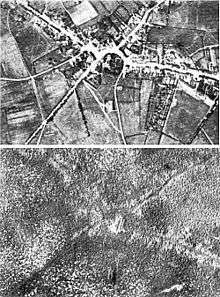Alexander Edwards
| Alexander Edwards | |
|---|---|
 Sjt. Alexander Edwards, V.C. | |
| Born |
4 November 1885 Stotfield, Lossiemouth, Moray, Scotland |
| Died |
24 March 1918 (aged 32) Bapaume Wood, east of Arras, France |
| Buried at | Remembered on the Arras Memorial |
| Allegiance |
|
| Service/branch |
|
| Years of service | 1914 - 1918 |
| Rank | Sergeant |
| Unit | 1/6th (Morayshire) Bn, the Seaforth Highlanders, 51st Highland |
| Battles/wars |
Battle of Passchendaele Spring Offensive |
| Awards | Victoria Cross |
Alexander Edwards VC (4 November 1885 – 24 March 1918) was a Scottish recipient of the Victoria Cross, the highest and most prestigious award for gallantry in the face of the enemy that can be awarded to British and Commonwealth forces.
He was born in Stotfield, Lossiemouth, Morayshire. He was the son of a fisherman and became a cooper working in the herring fishery. He served with the 1/6th (Morayshire) Bn, the Seaforth Highlanders, 51st Highland Division and joined the battalion at Elgin in July 1914. Edwards demonstrated tremendous bravery and was awarded the Victoria Cross for his actions at the Battle of Pilckem Ridge during the first day of the Battle of Passchendaele.
Citation
An extract from "The London Gazette," dated 14 September 1917, recorded the following:
For most conspicuous bravery in attack, when, having located a hostile machine gun in a wood, he, with great dash and courage, led some men against it, killed all the team and captured the gun. Later, when a sniper was causing casualties, he crawled out to stalk him, and although badly wounded in the arm, went on and killed him. One officer only was now left with the company, and, realising that the success of the operation depended on the capture of the furthest objective, Serjt. Edwards, regardless of his wound, led his men on till this objective was captured. He subsequently showed great skill in consolidating his position, and very great daring in personal reconnaissance. Although again twice wounded on the following day, this very gallant N.C.O. maintained throughout a complete disregard for personal safety, and his high example of coolness and determination engendered a fine fighting spirit in his men.[1]
Killed in action
On the 21 March 1918 the Germans began the ferocious Kaiserschlacht spring offensive and on 24 March, Edwards was killed and missing in action at Bapaume Wood, east of Arras, France. For three days the Division fought in trenches, then for two days fought stubborn rear-guard actions. During those critical days of March the casualties of the Division numbered 219 officers and 4,666 other ranks, of which 2,714 were missing.

Commemoration
Serjeant Edwards is commemorated at Bay 8 on the Arras Memorial.[2]
Edwards was a Freemason being a member of Lodge Pitgaveny, No.681, (Lossiemouth, Moray, Scotland). He is named on a Roll of Honour with the Lodge as follows: 'Sergt. Alex. Edwards V.C. ⅛ [Eighth] Seaforth Highlanders. A local newspaper reported: 'A tablet of Sicilian marble was unveiled on Sunday within the hall of Pigaveny Masonic Lodge, Lossiemouth, by Colonel S. Gair, P.M., [Past Master] Lodge Kilmolymock, [No.45] (Elgin, Moray), to the memory of the 23 brethren who fell in the war. After Colonel Gair drew aside the Union Jack, R.W.M. (Right Worshipful Master) A. Knight read out the names. In his address Colonel Gair referred to the late Sergeant Alex. Edwards, of the Seaforth [Highlanders] V.C., and said one of the memories he retained of France was how, on many a disagreeable and stiff night, Sergeant Edwards used to meet him with a cheerful smile. When the local battalion of the Seaforths was being formed they from Lossiemouth a splendid detachment, who could not be excelled in their gallantry.[3]
The medal
His Victoria Cross is displayed at the Regimental Museum of Queen's Own Highlanders in Fort George, Inverness-shire, Scotland.
References
- ↑ The London Gazette: (Supplement) no. 30284. p. 9532. 14 September 1917. Retrieved 3 May 2015.
- ↑ CWGC entry
- ↑ Year Book of the Grand Lodge of Scotland. 2014. p 129. ISBN 0902324-86-1
Further Reading
- Monuments to Courage (David Harvey, 1999)
- The Register of the Victoria Cross (This England, 1997)
- Scotland's Forgotten Valour (Graham Ross, 1995)
- VCs of the First World War - Passchendaele 1917 (Stephen Snelling, 1998)